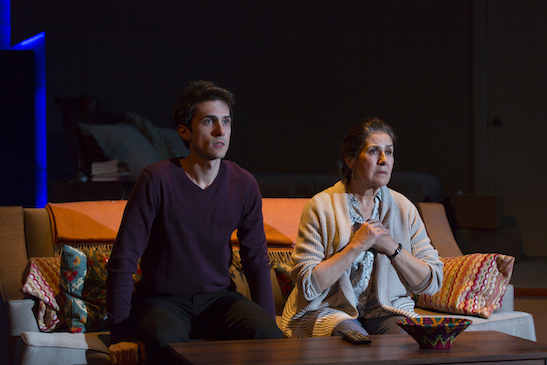Tony Meneses Puts His Audience Behind the Language Barrier at Two River Theater
The bilingual playwright deconstructs miscommunication in his new play ”Guadalupe in the Guest Room”.
Tony Meneses creates a world of gibberish in his new play, Guadalupe in the Guest Room, premiering at Red Bank, New Jersey's Two River Theater. Drawing from his own upbringing in a bilingual household, Meneses theatrically simulates the experience of a language barrier. The audience feels the same gap that distances his two main characters: a Mexican native named Guadalupe and her American son-in-law, Steve, both of whom (within a single household) grieve the loss of the woman who once connected them.
"It's a fascinating question I've been wondering about how to dramatize for a while," said Meneses, who uses telenovelas as the unlikely meeting point for these estranged individuals. As a native English speaker, the language barrier was never something he personally had to overcome. However, his parents' struggle to communicate, among other sources of unlikely inspiration, generated the story that is now making its world premiere with the New Jersey company.

Where did the idea for this story come from?
The actual plot came from talking with my best friend who was dating a guy of Indian descent — a very matriarchal culture. He had a lot of health problems, and she was just saying, "If we end up getting married, the mother is going to be a really active presence in our lives. If something were to happen to him, it would just be me and her." I thought that was such a fascinating dramatic question. What would happen to two people with no language and so many things to drive them apart? When the bridge between the two of them is lost, what a dramatically rich situation to explore.
How did you arrive at this mode of depicting the language barrier?
The play could have easily been told from the son-in-law's perspective — hearing him speak English and hearing [Guadalupe] respond in broken English. But I knew I wanted it to be [Guadalupe's] story, so I sort of had to find a "gimmick," if you will. The idea of using gibberish through her ears — I was like Oh, OK, this is something I can work with. So once I pinpointed that construct of hearing both of their perspectives and hearing them speak fluently, the play kind of just poured out from there.
Why did you decide to make telenovelas the basis for communication between your two main characters?
They're something that I grew up with. I know novelas like the back of my hand. And I've always heard from friends of mine — not just Latino friends — that their access point into the Spanish world, strangely enough, is always novelas. Everyone knows what novelas are. So I think it was the most successful point that I could find to bridge these two characters. They don't have a language, they don't really have culture, there are so many things separating them. So I just felt like [it would be] a fun entry point for these two characters to find a sense of unity.
Was the language barrier ever something you personally struggled with, or was it more a struggle for your parents?
It was more my parents and my siblings. I was the youngest of four when we moved to this country from Guadalajara, Mexico. I was a year old, so I really had no difficulty acquiring another language. But I know my siblings had some challenges at school, and I definitely noticed it on my parents' side. When you go to school, your teachers want to talk to your parents, and I realized very quickly, Oh, I'm going to have to translate for them. My siblings and I grew up speaking English to each other, so the more we spoke English, the more on the fringes of our lives [our parents] ended up being. They wouldn't participate as much just because they didn't have the access to language. It was always something I was curious about — their experience in this country and their lack of voice.
Did your parents ever tell you explicitly that it was a challenge for them?
I always observed it. At one point I asked them, "Do you guys ever feel like we're pushing you away by speaking in English?" I was always curious if they felt uninvited from our conversations. My mom [said] once that she sort of feels like a "shadow" now and then. It's a disheartening thing to hear. You don't want your parents to feel like they're not welcome. So I started to grapple with it artistically and decided to write a play about it.
Is the character Guadalupe based on your mother?
Yeah. I could say, Oh, it's totally not her, but it's totally her. [laughs] She saw the reading we did of it at the Lark. I think she was very tickled by it. I'm sure she's going to get a lot more from actually seeing the production, so I'm really excited.
How do you hope audiences respond to the play?
Most audiences won't have [Guadalupe's] experience. I want them to not just understand the difficulty of that, but to actually feel it. That's what makes theater really powerful. We get to feel the experience of somebody else and go through their story firsthand. In real life, we can be a little bit dismissive of somebody with a language barrier and sort of give up on that communication. I hope the audience can connect a little bit more to it and hopefully not discount people [who] have to go through that experience on a daily basis.

(© T. Charles Erickson)








